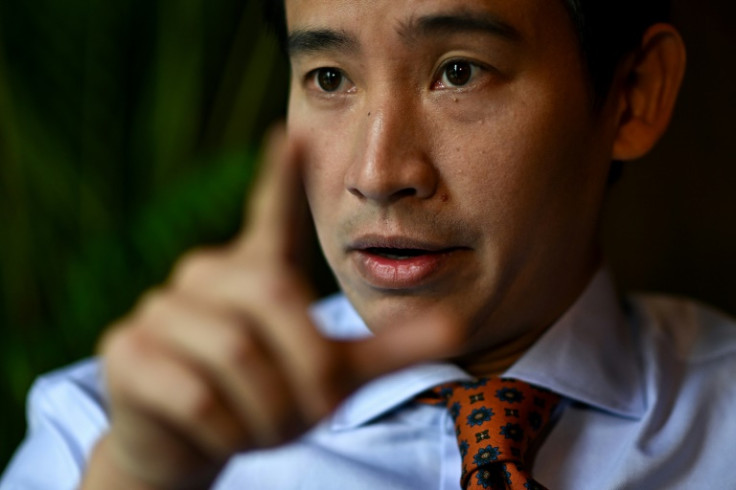Thwarted Thai PM Candidate Pita Vows To Run Again: AFP Interview

Thwarted Thai election winner Pita Limjaroenrat vowed Thursday to run for prime minister again, defying conservative forces that blocked him from the job this year and despite a looming court case.
The 43-year-old led his Move Forward Party (MFP) to a shock first-place finish in May's general election, buoyed by young and urban Thais weary of a near-decade of military rule -- only to be prevented from becoming premier by royalist and pro-military blocs opposed to his reformist agenda.
MFP's former allies Pheu Thai then formed a coalition government with army-linked parties, leaving the progressive challengers back on the opposition bench -- and Pita perhaps in the political wilderness.
He also faces a legal challenge thrown at him after the election that could see him banned from running for years.
But in an interview with AFP, he vowed to take another tilt at the premiership.
"Of course. I'm not giving up, and it's just a matter of time," he said when asked if he planned to run again.
But a number of roadblocks remain, not least his suspension as an MP.
MFP won the most seats in the May 14 poll but fell short of an outright majority and joined forces with Pheu Thai.
However, a candidate needs a majority across both houses of parliament to become prime minister and Pita could not muster enough votes to overcome opposition in the junta-appointed Senate.
He lost a first vote, then was blocked from running in a second ballot for the premiership and suspended as an MP by the Constitutional Court over his ownership of media shares, prohibited for lawmakers under Thai law.
Pita denies any wrongdoing and said he was "very confident" about the case.
"It was the old guard, someone who found a loophole that they can use constitutional hardball," he said of the media share case.
This "old guard" -- a powerful establishment of senior military, royalists and super-wealthy business clans -- has dominated Thai politics for decades, both overtly and behind the scenes.
MFP's campaign promises to reform the army, soften royal defamation laws and break up monopolies cut to the heart of this elite's interests.
While much of the resistance to Pita's mooted premiership cited his lese majeste pledges, accusing him of undermining the monarchy, he said this was a "shield" covering the other "two Ms" -- monopolies and the military.
Pita said he remained optimistic and said "everything can be changed" despite the setbacks.
Thai voters had shown that they were looking for an alternative "and they're willing to go with a road less travelled", he said.
He pointed to South Korea and Indonesia, which transformed from long periods of military rule to democracy in the 1980s and 1990s.
Pheu Thai's Srettha Thavisin took office as prime minister in August, ending months of political deadlock but raising eyebrows about the government's composition.
Voters roundly rejected the pro-military parties that formed the outgoing administration but those same parties found themselves in Srettha's government.
Pheu Thai is the latest incarnation of the political movement founded by telecoms billionaire Thaksin Shinawatra, the two-time prime minister ousted by the military.
Much of the past two decades of Thai politics has been dominated by the tussle between the generals and Thaksin's parties, so the decision to ally with army-linked groups came as a shock to many Pheu Thai supporters.
Pita said Pheu Thai would pay a "hefty" price.
He said a key test for Srettha will be whether he allows a law liberalising Thailand's liquor producing licences to get a hearing in parliament. Brewing in Thailand is currently dominated by two powerful players.
"If he stops that from entering the parliament, that's a very transparent answer," said Pita, a father of one who drew huge crowds on the campaign trail.
Educated in Thailand and at Harvard, the former Grab executive was drawn into politics in 2018 when he joined MFP predecessor Future Forward.
© Copyright AFP 2025. All rights reserved.





















